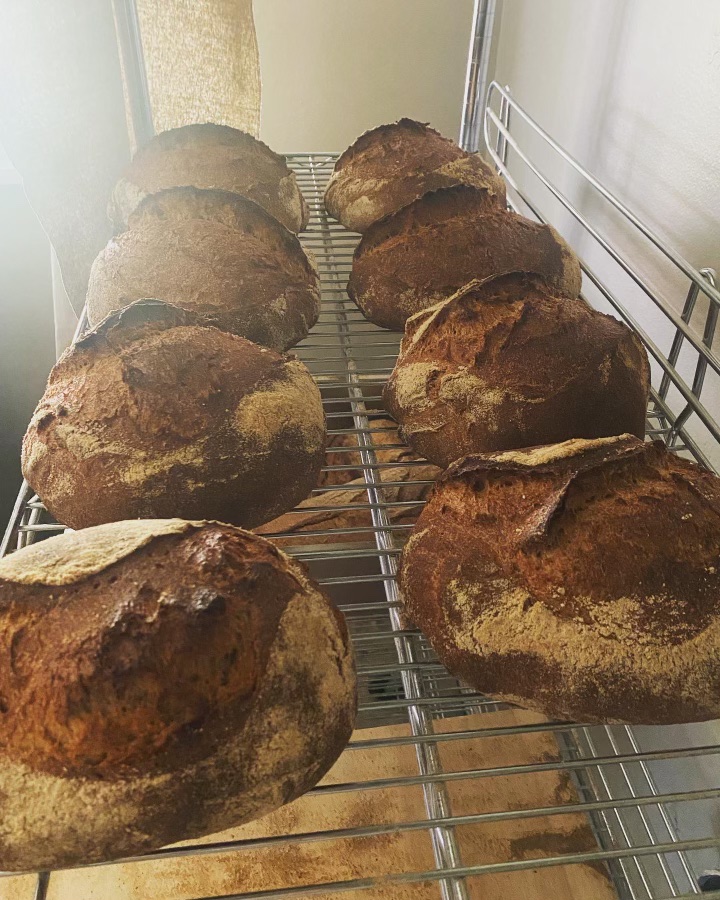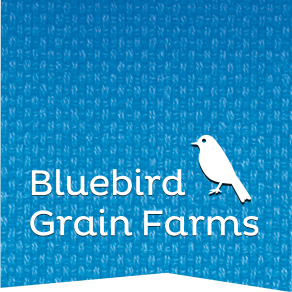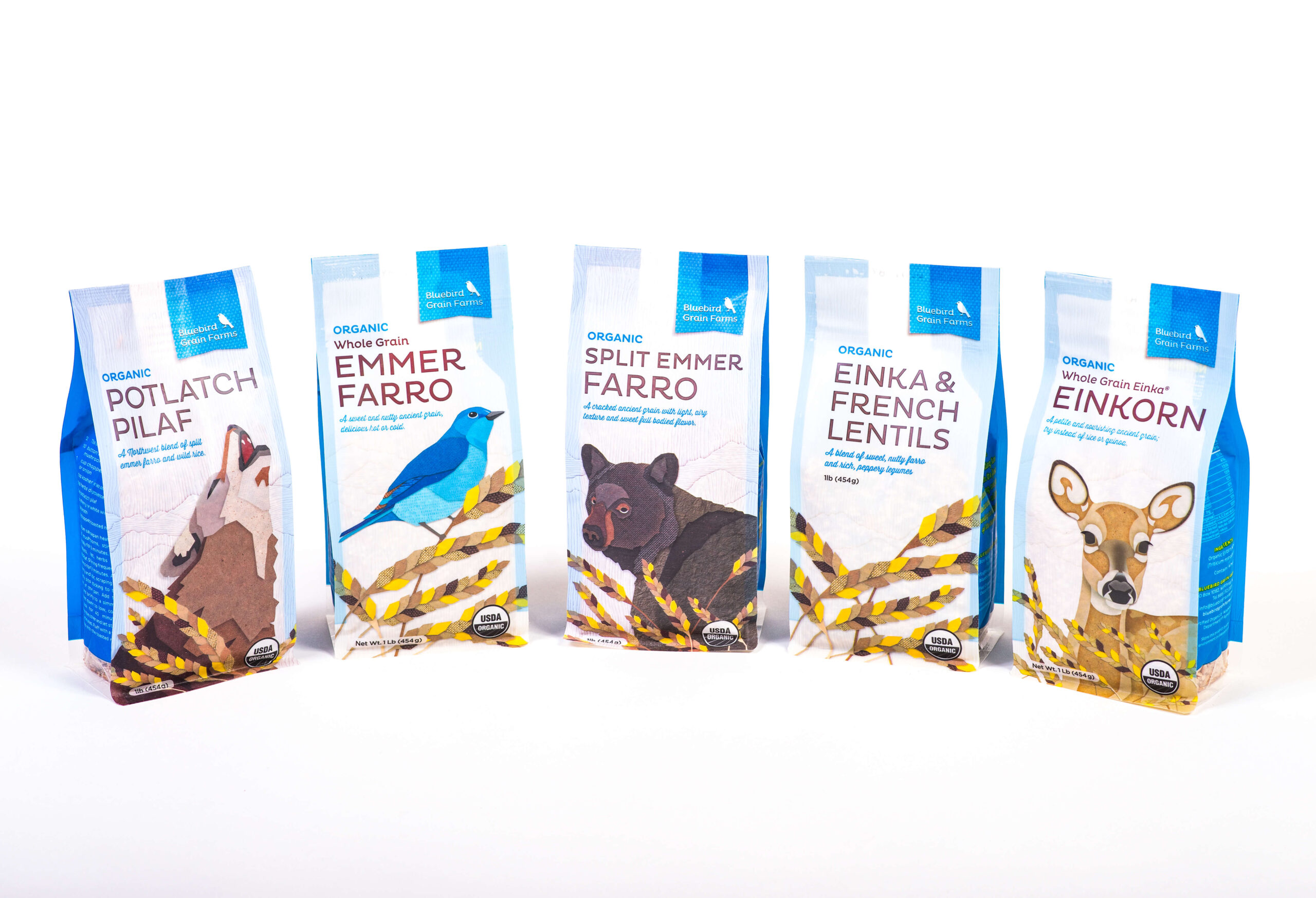
Ashley Lodato, Bluebird Grain Farms staff writer. Photos courtesy of Punk Rock Bread

Punk Rock Bread co-founder Ian Beert loves bread, “always and forever,” but his wife, Andrea, wasn’t able to eat it. Like so many in the modern era, Andrea couldn’t digest gluten properly. Andrea had somewhat resigned herself to a life without bread, until one day the couple was at a food conference and “there were these huge slices of bread with raw cheese on them,” she says. “Ian turned to me and said ‘We are going to figure this out.'”
The Beerts’ backgrounds in the natural food industry (they were part of the founding team of Hope Hummus) and food development & consulting coupled with their inquisitive temperaments led them into a “deep dive” into grains, biodynamics, regenerative growing practices, and other aspects of food nutrition that Andrea says she can just “nerd out on.” The more they learned, the more “the story of what we’ve done to flour” disturbed them. They wanted to enter the conversation about grains, and decided to access it through practical means. So they started baking.
Ian didn’t grow up in a baking family, but he began tinkering, “lazily following recipes,” he says. He soon became attracted to the “rigor and practice of baking old world sourdough bread”–a standard that he has carried with him into Punk Rock Bread, where all the loaves are slow-rise, naturally fermented, and made with 100% whole grain wheat flour.
Based in the Willamette Valley’s wine country, Punk Rock Bread sells fresh loaves direct to consumer–you can order through DM on their Instagram page and pick up your bread in McMinnville–as well as at Source Farms’ farm store and restaurant. And the lucky subscribers in Source Farms’ CSA program get Punk Rock Bread products–including cookie dough!–in their share boxes.
As the Beerts dug into sourcing the best grains for their bread, they learned that the ancient grain varieties were often more digestible than their modern counterparts. But the biggest difference in flours was, unsurprisingly, what was added in the growing process and what was removed in the milling process. “You’d talk to a grower and they’d say ‘Oh yeah, our grains are all natural, we are mostly organic, we just use a tiny bit of glyphosate,'” Ian says. “No! That’s not ok! We wanted to use grains that were truly organic, grown in a way that honors the farmer’s partnership with the land, and milled with all the good stuff left in.”

“Bluebird Grain Farms was our best fit,” Ian says. Consequently, Punk Rock Bread uses Bluebird’s Organic Sonora Heritage Soft White Wheat Flour in its organic cookie dough and a record three Bluebird flours in its OG (pronounced “Oh Gee”) Batard: the Organic Pasayten Hard White Wheat Flour, the Organic Methow Hard Red Wheat Flour, and the Organic Einkorn Flour. The fourth flour in those loaves is a Willamette Valley malted purple karma barley.
The Beerts call the Sonoran flour cookies “yum town.” It’s partly their rich flavor and “medium rare” consistency and partly the knowledge that they can stand behind the ingredients: organic flour, organic certified humane grass-fed butter, organic coconut and panela sugar, organic sustainable vanilla, and organic fair-trade dark chocolate chips. Yum town indeed.
But the Beerts also have an affinity for the Sonora region of Mexico from whose heritage the Bluebird flour comes. After spending 16 years in Boulder, CO–going to college, marrying, and starting Hope Hummus– Ian and Andrea decided to explore other paths, which led them to San Miguel de Allende, Mexico, where they lived for a year. When they’d drive to and from San Miguel, they’d pass through the breadbasket region where the landrace wheat* is grown.
Eventually, though, “we wanted some more green,” Ian says. They also wanted community, which is what led them to Amity, OR, and a relationship with the organic farming community in Oregon’s fertile Willamette Valley.
 Ian and Andrea don’t just want to make bread–they want to make people think. The very name of their company suggests this. “Punk rock is a way of life, it’s a way of saying ‘think for yourself, question what is considered normal, resist the man,'” Ian says. “Well, for us it’s “resist glyphosate’!”
Ian and Andrea don’t just want to make bread–they want to make people think. The very name of their company suggests this. “Punk rock is a way of life, it’s a way of saying ‘think for yourself, question what is considered normal, resist the man,'” Ian says. “Well, for us it’s “resist glyphosate’!”
The Beerts believe that Americans were slowly gas-lit into considering highly processed white flour “normal.” Andrea says, “We’ve gone into some high-end restaurants, even farm-to-table restaurants, and you ask about the flour in their homemade pasta or focaccia, and they’ll say ‘oh, we just use regular flour.'”
“When did glyphosate-laden flour become the accepted norm?” she asks rhetorically. “How did we let flour get so estranged from its natural source?” Ian answers the rhetorical question.
“When the industrial milling machines were invented around the end of the 1800s, it became possible to remove the germ and grind up the endosperm into a fine white powder with a long shelf life. ‘All-purpose flour’ was now shelf-sta

ble, widely available, and basically completely distanced from what flour is supposed to be. It caused–and continues to cause–myriad health problems.”
Ian then asks his own rhetorical question. “In the 1800s there were more than 20,000 flour mills in the United States. That’s one mill for about every 1500-2000 people. Every small town had one. Now we’re down to just several hundred mills in the entire country and most of them are just producing all-purpose refined flour. How cool would it be if everyone had a grain mill so they could use fresh, whole-grain flour?”
It’s questions like these that inspire the Beerts to keep baking, keep experimenting, and keep making people question food systems. They’re also counting on people’s interest in participating in efforts to improve food systems and to learn from some of the old practices.

“It’s cool to see people become a part of Punk Rock Bread and what we’re trying to do. They just light up–it’s what drives us,” the Beerts say. “We know how hard it is to change people’s buying habits. We also know how hard it is to make and market products. We’re slowly making these connections. We’re just doing it differently.”
To learn more about Punk Rock Bread, find them on Instagram.
*Wheat landraces are composed of traditional crop varieties developed by farmers over decades to adapt to local environmental conditions and management practices. Rouge de Bourdeaux, another favorite of Punk Rock Bread, is another example of a landrace wheat. The Sonora wheat variety has been specifically adapted to a semi-arid climate, which is why it grows particularly well in both the Southern California/Northern Mexico region as well as in the Methow Valley, where Bluebird Grain Farms is located.

